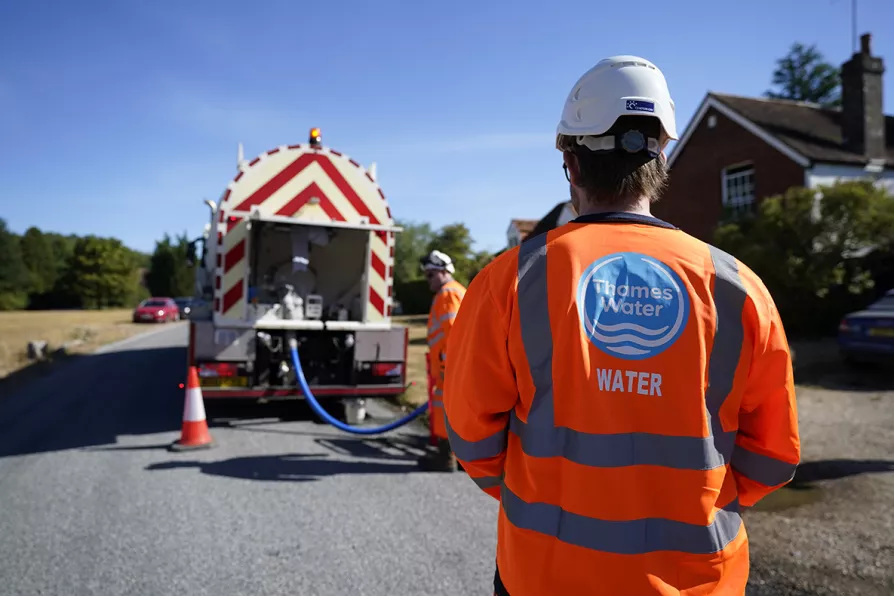
 A worker from Thames Water delivering a temporary water supply from a tanker to the village of Northend in Oxfordshire
A worker from Thames Water delivering a temporary water supply from a tanker to the village of Northend in Oxfordshire
THAMES Water’s record fines for sewage spills and improper dividends only underline our inability to hold water companies to account.
Water regulator Ofwat is hardly blameless when it comes to the supplier’s crippling debts, amassed by unscrupulous transnational corporations to shower their shareholders in cash — safe in the knowledge that when an essential service goes bust, it’s the British public that foots the bill.
It promotes Thames’s heavy fines as a sign it is getting tough with the crooks running England’s water supply — a virtually unique and costly experiment in privatisation (worldwide only England and Chile have fully privatised water) — for two reasons.
One, the fine (£122.7 million in total, £104.5m for breaching the rules around sewage discharges) is the biggest ever.
Two, the £18.2m fine for paying out dividends when it shouldn’t have — specifically, £37.5m in October 2023 and £131.3m in March 2024, both after the company announced it was on the brink of financial collapse — is the first time a water firm has been penalised for shareholder payouts.
Ofwat says the dividends were not appropriate since they did not “reflect the company’s delivery performance.”
According to Environment Secretary Steve Reed, this shows that “the era of profiting from failure is over,” and indeed stopping Britain’s gilded circle of corporate fat cats from paying themselves enormous sums for running their companies into the ground would be a sea change for the British economy.
But like Labour’s much-trumpeted Water (Special Measures) Act, which allows for water executives to be imprisoned for up to two years, the fine is about looking tough, not incentivising change.
Water bosses can only be jailed under Labour’s law if they obstruct a criminal investigation into their companies or try to cover up sewage spills.
But bosses have no need to, since the consequences of being caught releasing torrents of raw effluent into our rivers and seas — Thames Water poured 300,000 hours’ worth of sewage into waterways last year — do not affect them.
Fines, even heavy ones, redound on households, despite Ofwat’s loud insistence that they should not do so: a company’s private investors will claw back any losses through higher bills, just as it is Thames Water’s 16 million customers who will end up paying for the eye-watering interest rates charged by its creditors on its £3 billion bailout loan.
Water bosses know their rewards depend on satisfying their investors, who want to show a fat return on their money in the short term. And while they can expect to leech money out, the fact that the business itself may be failing doesn’t concern them: hence current Thames Water boss Chris Weston’s ability to pocket a £195,000 bonus after just three months in the job.
Ofwat is a captured regulator, and not just because chairman Iain Coucher (who made a fortune in another publicly subsidised privatised service, the railway, and who has named his extensive Sound of Jura estate Iainland) has been caught enjoying the hospitality of the water companies (as has Steve Reed).
Its negotiations with water firms on price hikes have allowed steep rises in household bills despite the rotten state of the network, which they say they have to pay to repair, being the direct result of their own mismanagement.
As Weston has himself made clear before parliamentary committees, making a privatised water firm pay for its crimes will simply see investors pull out, forcing the government to rescue it. Fines for bad behaviour are just one of the recognised business costs they weigh against the greater cost of investing in infrastructure and repairs, or delivering a value-for-money service.
Designing elaborate regulatory regimes to stop capitalists behaving like capitalists hasn’t worked any better for water than it has for energy. It’s a con, and the only way to ensure our water supply is managed in the public interest is to take it into public hands.














